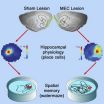An analysis of five large, prospective cohort studies indicates that lung (stage I), bladder, kidney and head and neck cancer survivors who smoked 20 or more cigarettes a day prior to their cancer diagnoses have an up to five-fold higher risk of developing a second smoking-associated cancer compared to survivors of the same cancers who never smoked. The association between smoking and developing a second primary smoking-associated cancer was similar to the association between smoking and developing a first primary smoking-associated cancer (patients who smoked more than 20 cigarettes per day had a 5.41-fold higher risk of developing cancer than individuals who have never smoked). Notably, current smoking at any level increased the risk of overall mortality across all cancer disease sites. The study, published on November 10 in the Journal of Clinical Oncology, affirms the 2014 Surgeon General report's conclusion that patients and survivors who smoke are at a higher risk of developing a second cancer.
Clinicians term an individual's initial diagnosis a first primary cancer. A second primary cancer is one diagnosed at some point after the first diagnosis. Second primary cancers are not metastases of the first cancer but instead are distinct, new malignancies. This study focused on patients with a history of cancer who developed a second primary cancer.
"As survival improves for a number of smoking-related cancers, patients are living longer; however, smoking may increase the risk of developing a second smoking-related cancer among these survivors," said lead study author Meredith S. Shiels, PhD, MHs, a research fellow with the National Cancer Institute's Division of Cancer Epidemiology and Genetics. "Our study demonstrates that health care providers should emphasize the importance of smoking cessation to all their patients, including cancer survivors."
Tobacco use constitutes the largest preventable cause of death and disability in developed countries and is a rapidly growing health problem in developing nations. It is responsible for 30% of all cancer deaths and is associated with increased risk for at least 17 types of cancer , . However, few studies have explored the association between smoking and second cancer risk. According to the authors, this is the largest study of its kind.
Researchers examined data from five prospective epidemiologic cohorts, which included 2,552 patients with stage I lung, 6,386 with bladder, 3,179 with kidney and 2,967 with head and neck cancer from the following studies: National Institutes of Health-AARP Diet and Health Study Agricultural Health Study Alpha-Tocopherol, Beta-Carotene Cancer Prevention Study Iowa Women's Health Study Prostate, Lung, Colorectal and Ovarian Cancer Screening Trial
A total of 866 second primary smoking-associated cancers were diagnosed among the survivors. The association between smoking status prior to primary cancer diagnosis and second smoking-associated cancer risk was assessed. Across all four cancer types, survivors who smoked 20 or more cigarettes per day at prior to their first primary diagnoses were more likely to develop a second smoking-associated cancer when compared to those who never smoked. Specifically, the risk increases were as follows: Stage I Lung Cancer: 3.3 times more likely to develop a second cancer Bladder Cancer: 3.7 times more likely to develop a second cancer Head and Neck Cancers: 4.5 times more likely to develop a second cancer Kidney Cancer: 5.3 times more likely to develop a second cancer
Current smokers who smoked fewer than 20 cigarettes per day and former smokers who had quit before their first cancer diagnosis also had an elevated risk of developing a second primary smoking-associated cancer compared to survivors who never smoked (although risks decreased with the number of years since smoking cessation).
Dr. Shiels stated that further research should directly assess the association between smoking after a first cancer diagnosis and second cancer risk.
INFORMATION:
This research was supported in part by the Intramural Research Program of the National Cancer Institute, National Institutes of Health.
ASCO is committed to educating its members and providing resources to help patients quit using tobacco. The Society has developed a policy statement that recommends integrating tobacco cessation into clinical care. In addition, ASCO has developed a detailed guide to help patients quit using tobacco. To access these resources, including materials from ASCO's patient-information website, Cancer.Net, please visit: http://www.asco.org/tobaccocessationguide.
Expert Perspective
Graham Warren MD, PhD, ASCO Expert and Chair, ASCO Tobacco Cessation Subcommittee
"As doctors, we want to give our patients the best chance at long-term survival as possible. This study is a reminder for us to aggressively support and encourage tobacco cessation at every step of the way, and should be a wake-up call for all smokers to take the necessary steps to quit."
Helpful Links from Cancer.Net, ASCO's cancer information website:
Stopping Tobacco Use After a Cancer Diagnosis
Tobacco Use
Understanding Cancer Risk
Lung Cancer: Overview
Bladder Cancer: Overview
Kidney Cancer: Overview
Head and Neck Cancer: Overview
About the Journal of Clinical Oncology
The Journal of Clinical Oncology is the tri-monthly peer-reviewed journal of the American Society of Clinical Oncology (ASCO), the world's leading professional society representing physicians who treat people with cancer.
About ASCO
Founded in 1964, the American Society of Clinical Oncology (ASCO) is the world's leading professional organization representing physicians who care for people with cancer. With more than 35,000 members, ASCO is committed to improving cancer care through scientific meetings, educational programs and peer-reviewed journals. ASCO is supported by its affiliate organization, the Conquer Cancer Foundation, which funds ground-breaking research and programs that make a tangible difference in the lives of people with cancer. For ASCO information and resources, visit http://www.asco.org. Patient-oriented cancer information is available at http://www.cancer.net.
Attribution to the journal of clinical oncology is requested in all news coverage.



